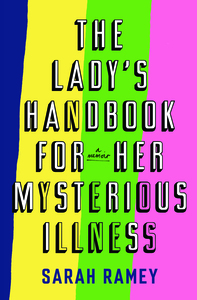Take a photo of a barcode or cover
challenging
dark
emotional
sad
tense
Sarah Ramey brings readers in for a very personal look at her captivating, heart-wrenching, page-turning, enraging health journey with her mysterious illness. Her vulnerability is a gift to us all, but especially those of us who suffer from mysterious, unexplained ailments doctors continually choose to ignore or explain away with diagnoses that have nothing to do with our bodies.
This gets four stars instead of five because of the very Gender Studies 101 way Ramey goes about describing "the masculine" and "the feminine" sides of health and wellness. She did go out of her way to try and be inclusive and respectful during her descriptions. Still, in doing so, she fell into the trap of using faux-progressive phrases like "women and femmes" and attempted to get to the root of the issue with our current patriarchal medical model by telling us to fall back on gendered forms of thinking and feeling. I agree with her premise, it just felt like she was not able to describe it effectively. It was a nauseating section to muddle through.
Another glaring issue with Ramey's attempt at creating a guidebook for women with mysterious illnesses is her lack of writing about finances and class privilege. She adds a sentence or two in every other chapter about her expensive all these different doctors, medications, and alternative treatments eventually become. She does not utter a word about Medicaid, or about how living with a disability can cause someone to forgo things like savings, a job with a better salary, or even marriage in order to keep the medical benefits they need to survive. How is Ramey able to afford all the alternative treatments she describes that are not covered by her ever-present insurance? Other than a sentence at the end of the book about how we should lobby our representatives to try and expand SNAP or get a wider array of treatments covered by insurance, she does little to acknowledge how someone without family money can access these. Ramey's parents are doctors. In one chapter, she discusses plans for living a healthier life that include "quitting your job and chasing your bliss" without pausing to mention how finances can trap people in these miserable, unhealthy cycles. She does not mention her class privilege at all. Does she think it's implied? Does it not occur to her that it's an important factor in her own health journey? It's a shame. Ramey's story is raw, illuminating, and very well written; it just lacks a meaningful class analysis that is inexcusable for any book about the healthcare system in the United States.
This gets four stars instead of five because of the very Gender Studies 101 way Ramey goes about describing "the masculine" and "the feminine" sides of health and wellness. She did go out of her way to try and be inclusive and respectful during her descriptions. Still, in doing so, she fell into the trap of using faux-progressive phrases like "women and femmes" and attempted to get to the root of the issue with our current patriarchal medical model by telling us to fall back on gendered forms of thinking and feeling. I agree with her premise, it just felt like she was not able to describe it effectively. It was a nauseating section to muddle through.
Another glaring issue with Ramey's attempt at creating a guidebook for women with mysterious illnesses is her lack of writing about finances and class privilege. She adds a sentence or two in every other chapter about her expensive all these different doctors, medications, and alternative treatments eventually become. She does not utter a word about Medicaid, or about how living with a disability can cause someone to forgo things like savings, a job with a better salary, or even marriage in order to keep the medical benefits they need to survive. How is Ramey able to afford all the alternative treatments she describes that are not covered by her ever-present insurance? Other than a sentence at the end of the book about how we should lobby our representatives to try and expand SNAP or get a wider array of treatments covered by insurance, she does little to acknowledge how someone without family money can access these. Ramey's parents are doctors. In one chapter, she discusses plans for living a healthier life that include "quitting your job and chasing your bliss" without pausing to mention how finances can trap people in these miserable, unhealthy cycles. She does not mention her class privilege at all. Does she think it's implied? Does it not occur to her that it's an important factor in her own health journey? It's a shame. Ramey's story is raw, illuminating, and very well written; it just lacks a meaningful class analysis that is inexcusable for any book about the healthcare system in the United States.
challenging
dark
emotional
informative
reflective
sad
medium-paced
This book is about Sarah's experience with her mysterious illness that the doctors cannot figure out. What she goes through is absolutely horrendous. I can't even imagine the pain that she's been living through physically and mentally. I think that this book is a great book if you have some sort of illness that doctors cannot figure out (or know little about) because it will make you feel seen. I don't have an illness and I still learned a lot. The book is depressing, anger inducing, and sad. There is a little bit of hope in there. In the book Sarah talks about Mark Hyman in a good sense and I'm not a fan at all and he was one of the biggest anti-Covid vax proponents out there. I understand why she went the functional medical route (I probably would too) and this book was published pre covid, but since the whole pandemic I've grown very leery of functional medical doctors. Loved the ending of the book with her dad!
A strong 3.5 read for women interested in their diagnosis of indeterminate causes. I have so many friends diagnosed with these random subtitle chronic illnesses. The truth here is that we need to have better healthcare and more discoveries in actual causes instead of labeling.
This book was just ... difficult to read
I went into this more for information and to read someone elses story, than to find any answers, but she completely lost me with the feminist rant in the middle, and all the medical terms.
Came out of it feeling a bit drained really.
I went into this more for information and to read someone elses story, than to find any answers, but she completely lost me with the feminist rant in the middle, and all the medical terms.
Came out of it feeling a bit drained really.
On the one hand, this book was compelling enough I stayed up late and read it in one sitting. As someone who has multiple chronic illnesses, there were parts of this book that were half formed thoughts in my head. Feeling seen is powerful, especially with not so visible illnesses.
On the other hand, it’s steeped in White Feminism and unable to contemplate anything outside of the white upper class (let’s be real, nobody in the middle class is able to alternate living and not living with their parents when so disabled they can’t even buy groceries let alone hold down a job). As other reviewers have noted, she somehow thinks this is a modern Western phenomenon and people in the developing world/global South and people before the 1960’s don’t have mysterious illnesses...as someone with type 1 diabetes, which was a fatal autoimmune illness (though it would be years before the autoimmune component was understood) before 1920 and the development of insulin long before the standard American diet and other modern changes, I find this really frustrating, not to mention racist/classist/xenophobic.
All in all, compelling as a memoir, science is borderline, feminist analysis is lacking. Still worth the read because I do agree that there are systemic issues that need addressed, and it was still very validating for invisible illnesses.
On the other hand, it’s steeped in White Feminism and unable to contemplate anything outside of the white upper class (let’s be real, nobody in the middle class is able to alternate living and not living with their parents when so disabled they can’t even buy groceries let alone hold down a job). As other reviewers have noted, she somehow thinks this is a modern Western phenomenon and people in the developing world/global South and people before the 1960’s don’t have mysterious illnesses...as someone with type 1 diabetes, which was a fatal autoimmune illness (though it would be years before the autoimmune component was understood) before 1920 and the development of insulin long before the standard American diet and other modern changes, I find this really frustrating, not to mention racist/classist/xenophobic.
All in all, compelling as a memoir, science is borderline, feminist analysis is lacking. Still worth the read because I do agree that there are systemic issues that need addressed, and it was still very validating for invisible illnesses.
challenging
dark
emotional
funny
hopeful
informative
inspiring
reflective
relaxing
fast-paced
I enjoyed so much of this book so much as someone who's had some sort of invisible illness of varying degree since I was 15 or so. And as someone who's benefited from functional medicine--my FM practitioner saved my life--I genuinely believe in a lot of the remedies recommended and have a long view of the health of the gut. But I also felt like the last third of the book hand-waved that having access to these remedies--functional medicine, supplements, rest, real food, screen economy, reduced stress, networked support, etc--is costly in all sorts of ways, and you can't not acknowledge that. You've got to have the means, you've got to have the time, you've got to have the support, which is privilege in action. I think she pays moderate service to it in a "we have to fix the system" way, which is true, but in the meantime, having a chronic illness is expensive and treating it on a cellular level and changing your life to accommodate that level of healing is an astronomical investment. That doesn't necessarily take away from everything else that resonated with me and made me feel seen and grateful and what I recognized (god save me from a male neurologist like ever again) but I think it's worth calling out.
challenging
dark
emotional
funny
hopeful
informative
inspiring
reflective
sad
fast-paced
dark
slow-paced
Disappointing use of a fantastic title. The author's story is truly horrific, and I feel for her. But she's overstating the state of current research and seems to be every bit as taken in by the newest hucksters as she was by the first set.
I'm not a scientist, so I can't evaluate the actual science she is looking at (though neither is she, and based on other reviews, neither can she). But I do know one thing for sure: some of the illnesses she talks about have been around for a very long time, and her generic "we should all eat like it's 1935!" prescription is complete BS. For one thing, why would it be good to eat like we are in the middle of the Great Depression? For another, I know that my own "mysterious illnesses" (which do appear in her enormous list) were absolutely causing problems for my ancestors in 1935, so changing my diet to match theirs would not help.
I was expecting better.
I'm not a scientist, so I can't evaluate the actual science she is looking at (though neither is she, and based on other reviews, neither can she). But I do know one thing for sure: some of the illnesses she talks about have been around for a very long time, and her generic "we should all eat like it's 1935!" prescription is complete BS. For one thing, why would it be good to eat like we are in the middle of the Great Depression? For another, I know that my own "mysterious illnesses" (which do appear in her enormous list) were absolutely causing problems for my ancestors in 1935, so changing my diet to match theirs would not help.
I was expecting better.
Graphic: Body horror, Chronic illness, Sexism, Medical content, Medical trauma, Gaslighting
Minor: Suicide


